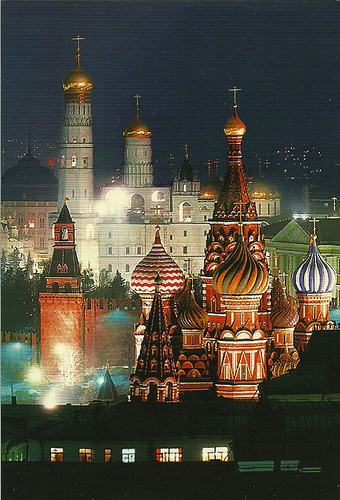Best Way to Learn Russian Language

As a linguist, I often get asked about best ways to learn languages. This post is in response to my friend Rachel's question on how to begin learning Russian.
First, the Big Linguistic Picture: all languages in the world are divided into Language Families. The largest such family is the Indo-European Family of Languages, originating from Sanscrit. It includes Hindi, MOST European Languages, Persian, etc.
Which means that we all – the English speakers, French Speakers, German Speakers, Spanish Speakers, Russian speakers, Hindi speakers and… Persian speakers (in other words, Iranians,) belong to one huge family. Kinda makes you pause and think, doesn't it?
The Russian Language is part of the Slavic group of languages, specifically, the Eastern Slavic sub-group, together with Ukrainian and Belorussian.
Russian Language is one of the 4 official UN languages and one of several principal languages on the planet. It is spoken as the first language by 170 mln people in Russia and abroad, and several times as many, as a second or additional language.
Russian is considered a difficult language to learn by Westerners, based on its relatively complex grammar and different alphabet. But take it from someone who mastered several different languages – I can tell you from personal experience that English is a much crazier language than Russian, yet scores of people around the world learn it and speak it every day.
So no worries! Just take a deep breath and use my formula for learning any language: CONCENTRATE ON SIMILARITIES RATHER THAN DIFFERENCES, and I promise, your language learning experience will be a breeze!
I've done some research for you on ways to learn Russian, based on what's available on the market today. These seem to be the best options, both paid and free.
1. PAID: Berlitz is an old and reputable language learning company. They are not cheap, but here is internet option – it may be quite affordable. They require filling out a form in order to get a quote. This is a more serious program.
http://www.berlitz.us/Core/Display.aspx?pageId=269
2. PAID: This seems like an interesting and affordable program:
http://russian-accelerator2.com/?gclid=CJ23r4W1pK4CFcjc4AoddCurSg
They have beginners (Russian Accelerator) and advanced (Accelerator II) courses. This is a simplified program and may not offer reading ability. But I like their methodology and approach.
TIPS: Here are some tips on learning Russian fast
http://learnrussianfast.com/how-to-learn-russian-fast.html
3. FREE: This site has free insights and examples, including Russian alphabet, common phrases, numbers, etc.:
This is a good reference site. It's a good idea to read through all the available info here to get a frame of reference. However, I'd recommend to combine it with an interactive online (or in person) course, so you could also hear how words are pronounced, otherwise, it may be a bit confusing.
TIPS: in order to be able to read, it is a must to learn the Russian alphabet, which is available at the above free site.
To me, learning the Russian alphabet to be able to read, is very important, since all signs in Russia would be in Russian, and you really don't want to feel handicapped.
I noticed that many American programs skip this step and try to teach you how to learn to speak phonetically, without anchoring it in written language. To me, it's a one-sided approach. But, perhaps, for those who want to just get the flavor for the language, it's a justified shortcut, which will allow you to start using the language quickly. It may be easier to learn how to speak first, and then, eventually, take the next step and learn how to read, as well.
That said, when I taught my students, they learned Russian alphabet in 45 minutes and could read in Russian within 2-3 lessons. All, because I concentrated on similarities, instead of differences.
So, don't let them scare you by saying that Russian alphabet is difficult. The look and roots of the Russian letters are much the same as Latin letters. Both alphabets originate from Ancient Greek. Some letters may sound different – so what? It's not Chinese, after all, with its several thousand written characters. It's just 33 letters! No big deal!
In fact, as a linguist, I am trained to spot similarities and common roots among words of different languages. You'd be amazed how many similar roots there are in Russian and English, as well as other European languages. All because, as I pointed out earlier, they are all part of the huge Indo-European Language Family. Which means that even Hindi language roots will be similar.
4. FREE: Another Free program – I think, it's a good one! Worth checking out.
http://www.russianlessons.net/
5. PAID: Also, check out this interesting program – could be fun and relatively affordable – which will be available in May.
http://www.languagemetropolis.com/?gclid=COC9lpS6pK4CFYeK4AodCAu8TA
6. PAID: new, very promising course, which combines audio, visual and interactive capabilities. They call it Dynamic Immersion program. Worth checking out!
http://www.rosettastone.com/learn-russian
Hope all this helps and please leave your comments to let me know how you are progressing!
Wishing you much fun and best of luck on your new language adventure!
Lada








 newest »
newest »
 Learn Russians by the natives of Russians itself and get benefited from the Russian 1 language course http://www.ribttes.com/one-year-russi...
Learn Russians by the natives of Russians itself and get benefited from the Russian 1 language course http://www.ribttes.com/one-year-russi...



